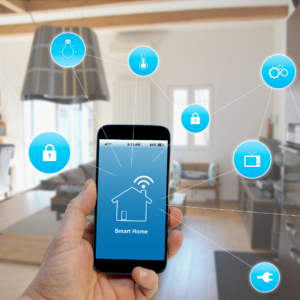
The world around us is surrounded by technology that is constantly evolving. Investment property owners are following the trends, and some have been converting their rental properties into 'smart homes'. The technology industry has created devices that range from video doorbells, voice-activated appliances, noise control, flood detection, and more! While smart home devices were created for convenience, they can sometimes feel a little intimidating. Additionally, smart home devices can come at a cost as they are in high demand. So, is converting your rental property to a smart home the best choice? Let's take a look at some of top considerations associated with adopting smart technology into your rental.
What is a Smart Home?
Simply put, a smart home is a home equipped with lighting, heating, and electronic devices that can be controlled remotely by a phone or computer. Smart home technology allows you to control almost every aspect of your home at the touch of a button.
Types of Smart Home Technology
The most commonly used smart home technology devices control lighting, security, appliances, and temperature control.
- Lighting- The resident has the ability to set schedules for turning lights on and off, dimmable light features, and control energy output, all from a hub or smartphone device. Smart lighting also eliminates the need for additional outlets and wall switches due to the smart lights' ability to be plugged in anywhere.
- Security- Smart Home security is the largest component of adopting a 'smart' lifestyle. Smart home security allows the owner and resident to view live footage of their property when away, receive notifications and alerts, detect carbon monoxide or potential fires, trigger alarms to local police and fire departments, and remotely lock doors and windows.
- Appliances- Many new appliances on the market are equipped with smart data technology that will provide maintenance alerts and recalls and provide the ability to request service.
- Temperature Control- Possibly the most commonly seen facet of smart technology. Temperature control or 'smart thermostats' have taken the smart technology market by storm. Smart thermostats provide the ability to remotely control a home's temperature by lifestyle sensing, programming schedules, and adjustments based on the local weather.
Why Should a Landlord Invest in Smart Technology?
The next generation of renters is among us. Millennials are more tech-savvy than generations prior and expect the accessibility and convenience of technology at their fingertips. Converting a rental property to a smart home is a value-add amenity for many potential tenants. Additionally, many rental shoppers may have smart home technology at the top of their requirement list. The added technology may create somewhat of a niche market when advertising to future tenants. This can also work in the owner's favor as more technology and amenities equals the ability to market a higher rent for their respective property.
Benefits of Smart Home Technology
Smart home technology has huge benefits for both the renter and the property owner. Tenants enjoy the ability to set temperature control schedules, turn lights on and off, and get alerts from their appliances, such as when the dishwasher cycle is complete. This can help to keep their utility bills low and help with month-over-month budgeting. Property owners can immensely benefit from smart home technology by ensuring that their investment remains in ideal condition. Landlords who provide utilities as part of their benefits package can maintain energy efficiency in their rental with smart thermostats. Smart technology can also track necessary maintenance in the home, which can save thousands of dollars down the road if they were not made aware of an underlying issue.
Concerns with Smart Home Technology
The largest concern surrounding smart technology is maintaining privacy. Smart technology can store a lot of data regarding a tenant's habits, daily activities, and even where the tenant is located in the home. This may raise some serious concerns for potential residents. Owners can mitigate this risk by vetting smart home providers to ensure that data is stored securely. Another concern that falls on the owner of the property is the cost surrounding converting to a smart home. According to homeadvisor.com, a full smart home conversion can cost anywhere from $10,000 - $150,000, depending on the features you are requesting. Smart technology can be a great way to make your rental property more efficient and convenient for tenants. Well-managed smart technology can make a landlord's job much easier! With some research and uncovering your needs as well as your tenants, you can create a positive tech experience for everyone Are you currently looking for homes to rent in the Treasure Valley area of Idaho? Our lists are continuously updated, and houses move quickly here at RentWise Property Management. Feel free to check out our current listings!


